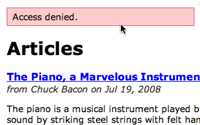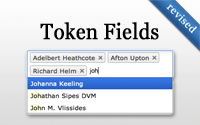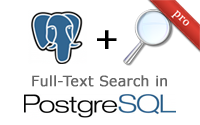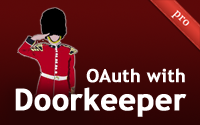Categories
- Active Record
- Active Resource
- Active Support
- Administration
- Ajax
- APIs
- Authentication
- Authorization
- Background Jobs
- Caching
- Code Walkthrough
- Controllers
- Debugging
- Deployment
- eCommerce
- Forms
- Mailing
- Models
- Performance
- Plugins
- Production
- Rack
- Rails 2.0
- Rails 2.1
- Rails 2.2
- Rails 2.3
- Rails 3.0
- Rails 3.1
- Rails 3.2
- Rails 4.0
- Refactoring
- Routing
- Search
- Security
- Testing
- Tools
- Views
Declarative Authorization
Declarative authorization provides an advanced and powerful solution for role based authorization.
(15 minutes)
Authorization with CanCan
CanCan is a simple authorization plugin that offers a lot of flexibility. See how to use it in this episode.
(15 minutes)
Strong Parameters
The strong_parameters gem is an improvement over attr_accessible to securely handle mass assignment even when you have complex authorization logic. The functionality will likely be added to Rails 4 so it is a good idea to learn how it works.
(12 minutes)
Token Fields (revised)
The Chosen plugin makes it easy to turn a many-to-many select menu into a searchable token field. Then see how the jQuery Tokeninput field can help with AJAX loading and creating new records.
(10 minutes)
Devise and OmniAuth (revised)
In this episode I build upon a standard Devise setup and show how to add 3rd party authentication using OmniAuth. This includes support for user validations and is compatible with normal password authentication.
(10 minutes)
Active Record Reputation System
If you need to calculate an average user's rating or sum up a number of votes, consider using the activerecord-reputation-system gem. Here I will cover the basics and also briefly present a from-scratch solution.
(10 minutes)
Full-Text Search in PostgreSQL
Postgres offers full-text searching right out of the box. This episode shows how to write queries from scratch, apply tools like Texticle and pg_search, and optimize performance through indexes.
(16 minutes)
Hstore
With hstore you can add schema-less data to PostgreSQL. This allows you to store model attributes without creating separate database columns. Watch how to do this using the activerecord-postgres-hstore gem.
(10 minutes)
OAuth with Doorkeeper
Doorkeeper makes it easy to create an OAuth 2 provider. This episode also shows how to setup OmniAuth as an OAuth client and use the oauth2 gem to communicate with an API.
(19 minutes)
Extending Refinery CMS
Here I continue on Refinery and show how to add database-backed content by generating an engine. You will also learn how to override Refinery's views and controllers in this episode.
(14 minutes)










